Related Research Articles
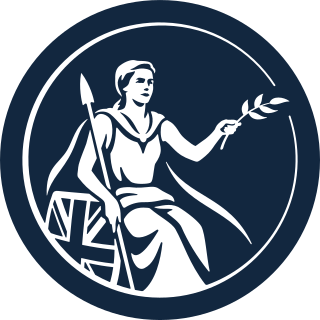
The Bank of England is the central bank of the United Kingdom and the model on which most modern central banks have been based. Established in 1694 to act as the English Government's banker and debt manager, and still one of the bankers for the Government of the United Kingdom, it is the world's eighth-oldest bank.

The East India Company (EIC) was an English, and later British, joint-stock company founded in 1600 and dissolved in 1874. It was formed to trade in the Indian Ocean region, initially with the East Indies, and later with East Asia. The company gained control of large parts of South Asia and colonised parts of Southeast Asia and Hong Kong. At its peak, the company was the largest corporation in the world by various measures and had its own armed forces in the form of the company's three presidency armies, totalling about 260,000 soldiers, twice the size of the British army at the time.
The history of Victoria refers to the history of the Australian state of Victoria and the area's preceding Indigenous and British colonial societies.
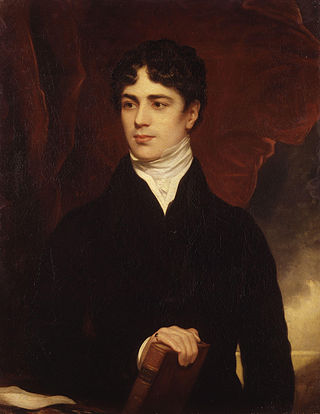
John George Lambton, 1st Earl of Durham,, also known as "Radical Jack" and commonly referred to in Canadian history texts simply as Lord Durham, was a British Whig statesman, colonial administrator, Governor General and high commissioner of British North America. A leading reformer, Durham played a major role in the passage of the Reform Bill of 1832. He later served as ambassador to Russia. He was a founding member and chairman of the New Zealand Company that played a key role in the colonisation of New Zealand. George Woodcock says that he was, "Proud, wayward, immensely rich, with romantic good looks and an explosive temper." He was one of those "natural rebels who turn their rebellious energies to constructive purposes. Both at home and abroad he became a powerful exponent of the early nineteenth-century liberal spirit."
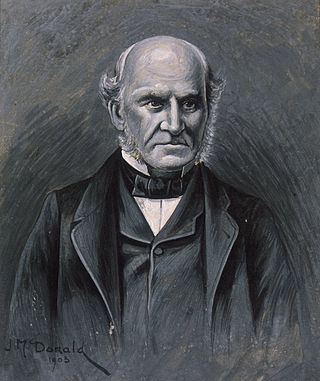
James Busby was the British Resident in New Zealand from 1833 to 1840. He was involved in drafting the 1835 Declaration of the Independence of New Zealand and the 1840 Treaty of Waitangi. As British Resident, he acted as New Zealand's first jurist and the "originator of law in Aotearoa", to whom New Zealand "owes almost all of its underlying jurisprudence". Busby is regarded as the father of the Australian wine industry, as he brought the first collection of vine stock from Spain and France to Australia.

Levi Lincoln Jr. was an American lawyer and politician from Worcester, Massachusetts. He was the 13th governor of Massachusetts (1825–1834) and represented the state in the U.S. Congress (1834–1841). Lincoln's nine-year tenure as governor is the longest consecutive service in state history; only Michael Dukakis, John Hancock and Caleb Strong served more years, but they were not consecutive.

John Macarthur was a British Army officer, entrepreneur, landowner and politician who was a highly influential figure in the establishment of the colony of New South Wales. He was also a pioneer of the Australian Merino wool industry, and was instrumental in agitating for, and organising, a rebellion against Governor William Bligh in what is now termed as the Rum Rebellion in January 1808.
William Manning was a British merchant, politician, and Governor of the Bank of England.

Major General Robert Henry Wynyard was a British Army officer and New Zealand colonial administrator, serving at various times as Lieutenant Governor of New Ulster Province, Administrator of the Government, and was the first Superintendent of Auckland Province.

Edward Ellice the Elder, known in his time as the "Bear", was a British merchant and politician. He was a Director of the Hudson's Bay Company and a prime mover behind the Reform Bill of 1832.

Robert Torrens was a Royal Marines officer, political economist, part-owner of the influential Globe newspaper, and a prolific writer. He also chaired the board of the London-based South Australian Colonisation Commission created by the South Australia Act 1834 to oversee the new colony of South Australia, before the colony went bankrupt and he was sacked in 1841. He was chiefly known for championing the cause for emigration to the new colony, and his name lives on in Adelaide's main river, the Torrens, the suburb of Torrensville and a few other places.
George Lyall was an English merchant and politician, Chairman of the Honourable East India Company for periods 1841–3 and 1844–6.
Russell Ellice was a British businessman who was Chairman of the East India Company and one of the first Directors of the British American Land Company. Ellice was also a Director of the first New Zealand Company and also the second New Zealand Company Ellice was also a Governor of North American Colonial Association of Ireland and subsequently Chairman.
Abraham Wildey Robarts, of Hill Street, Berkeley Square, Middlesex, was an English politician and banker.
George Palmer (1772–1853) was an English businessman, politician, and philanthropist.
Timothy Abraham Curtis was Governor of the Bank of England from 1837 to 1839. He had been Deputy Governor from 1834 to 1837. He replaced James Pattison as Governor and was succeeded by John Reid. Curtis' tenure as Governor occurred during the Panic of 1837. In June 2020, the Bank of England issued a public apology for the involvement of Curtis, amongst other employees, in the slave trade following the investigation by the Centre for the Study of the Legacies of British Slave-ownership at UCL.
Henry Lancelot Holland was an English industrialist and banker, Governor of the Bank of England from 1865 to 1867.
Aaron Chapman was an English writer and politician. He was the inaugural member of Parliament for Whitby, representing the Conservative Party.
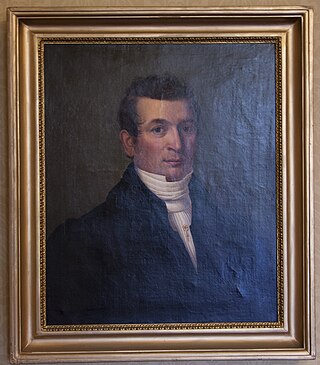
John Ellerker Boulcott (1784–1855) was a London merchant and shipowner. He was a director of the London and Dublin Bank and also a director of the New Zealand Company and he served as the sheriff of Merioneth in Wales. He owned considerable land and buildings in London and other property just outside the city by the time of his death in 1855.
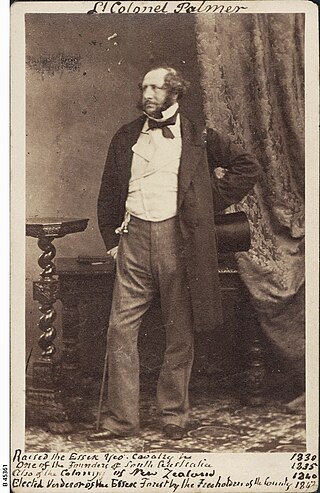
George Palmer, also referred to as George Palmer Jnr, was a lieutenant colonel in the Essex Yeomanry, and one of the South Australian Colonisation Commissioners appointed on 5 May 1835.
References
- ↑ Governors of the Bank of England. Archived 12 February 2012 at the Wayback Machine Bank of England, London, 2013. Archived here. Retrieved 21 March 2016.
- ↑ Adams, Peter (2013). Fatal Necessity: British Intervention in New Zealand, 1830–1847. BWB e-Book. Bridget Williams Books. p. 197. ISBN 978-1-927277-19-5 . Retrieved 9 December 2020.
...first published in 1977.
- ↑ McDonnell, Hilda (2002). "Chapter 3: The New Zealand Company of 1825". The Rosanna Settlers: with Captain Herd on the coast of New Zealand 1826-7 . Retrieved 9 December 2020– via Wellington City Libraries.
including Thomas Shepherd's Journal and his coastal views, The NZ Company of 1825.
- ↑ Wakefield, Edward Jerningham (1845). Adventure in New Zealand, from 1839 to 1844: With Some Account of the Beginning of the British Colonization of the Islands. John Murray. p. 4. Retrieved 9 December 2020.
Digitised 22 July 2009